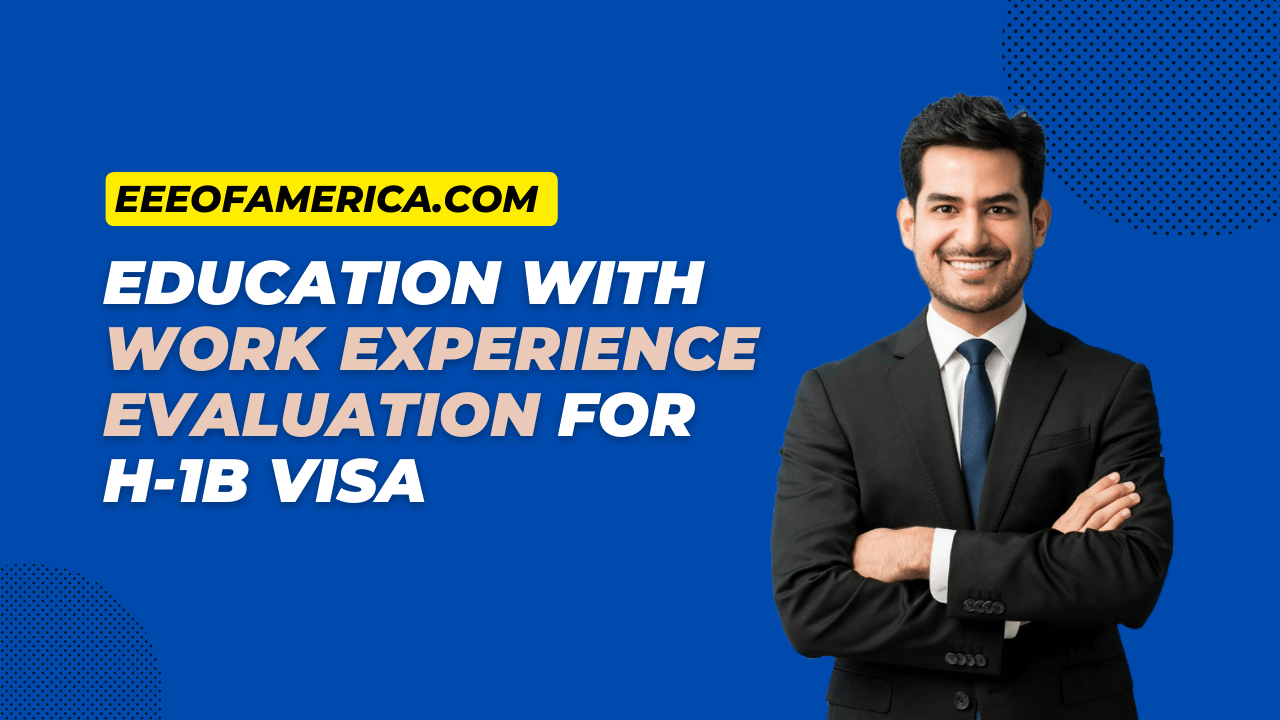The H-1B visa has been a beacon of hope for countless skilled professionals seeking to work in the United States. This non-immigrant visa category allows U.S. employers to hire foreign workers in specialized occupations temporarily.
However, obtaining an H-1B visa involves navigating a complex labyrinth of requirements and procedures, including the essential component of an education with work experience evaluation.
In this comprehensive guide, we will delve deep into the intricacies of this evaluation process, helping you understand its significance, process, requirements, and how a reliable service provider such as EEE OF AMERICA can streamline your journey towards obtaining an H-1B visa.
About Education with Work Experience Evaluation for H-1B
The education with work experience evaluation is a critical part of the H-1B visa application process, designed to assess a candidate’s educational qualifications and relevant professional experience in relation to the proposed H-1B job position.
This evaluation ensures that the foreign worker meets the educational requirements necessary for a specialized occupation under H-1B regulations.
The Purpose of Education with Work Experience Evaluation
Primarily, the purpose of this evaluation is to demonstrate the equivalence of a foreign worker’s academic credentials and work experience to a U.S. bachelor’s degree or higher in a field related to the H-1B job position.
The U.S. Citizenship and Immigration Services (USCIS) necessitates that H-1B visa applicants have at least a U.S. bachelor’s degree or equivalent in their specialty.
Therefore, a comprehensive evaluation is vital to provide evidence to USCIS that you either possess a U.S. bachelor’s degree or that your combined foreign education and work experience are equivalent to a particular U.S. degree.
This evaluation is a cornerstone for strengthening your H-1B visa application and enhancing your chances of approval.
The Journey towards a Successful Education with Work Experience Evaluation
Embarking on the journey towards obtaining an education with work experience evaluation may seem daunting, but understanding the steps involved can simplify the process.
Step 1: Selecting a Trusted Credential Evaluation Agency
The first step involves choosing a trusted and reputable credential evaluation agency. These agencies have a deep understanding of global educational systems and can accurately evaluate and translate your degrees and work experience into their U.S. equivalents.
EEE OF AMERICA is one such comprehensive provider of foreign credential evaluations, offering a range of immigration services to cater to your specific needs.
Step 2: Gathering and Submitting the Required Documents
Once you select an evaluation agency, you need to gather and submit the necessary documents. These typically include your degree certificate, translated degree certificate by a certified translator, academic transcripts, translated transcripts, and detailed work experience documentation such as experience letters from previous employers.
Step 3: Undergoing the Evaluation Process
After submitting the required documents, the agency’s evaluators will thoroughly review your educational and professional credentials.
They will compare your foreign education and work experience to U.S. standards and produce a detailed report outlining the equivalency of your credentials.
Step 4: Receiving the Evaluation Report
Upon completion, you will receive an evaluation report, which includes information about your educational background, equivalency determination, and relevant notes or explanations.
Step 5: Including the Evaluation in Your H-1B Application
Finally, you need to include the education with work experience evaluation report in your H-1B visa application package. The evaluation report aids USCIS adjudicators in understanding the equivalency of your foreign education and its relevance to the specialized occupation you’re pursuing.
Preventing Potential USCIS Challenges to a Work Experience Evaluation
While education with work experience evaluations has been a standard procedure for H-1B applications, USCIS has been increasingly challenging these evaluations in recent years. Here are several strategies to prevent potential USCIS challenges:
The 3:1 Rule
This rule is a cornerstone of the work experience evaluation for H-1B. It states that three years of specialized training and/or work experience can be considered the equivalent of one year of college education.
Therefore, an individual with at least twelve years of progressively responsible experience in a certain field, without any post-secondary education, could be deemed qualified for a specialty occupation under this rule.
Detailed Work Verification Letters
USCIS has been emphasizing the importance of official and authoritative proof of the beneficiary’s work experience. Experience letters from all previous employers, clearly mentioning the dates worked, job duties performed, and the skill sets, are crucial. These letters should ideally be printed on the employer’s letterhead.
Progressive Work Experience
Progressive work experience is another significant component. This experience should indicate the individual’s advancement through their roles and duties with their previous employers.
Authority to Grant Credit
USCIS has been increasingly challenging the authority of the professors offering expert opinion letters, as well as the universities with which they are affiliated. USCIS wants to verify that the professor’s university has a program dedicated to granting college-level credit and that the professor has a letter from the university indicating his or her authority to grant such credit.
The Role of EEE OF AMERICA in Streamlining Your H-1B Journey
EEE Of America is a comprehensive provider of foreign credential evaluations, offering all your immigration services needs in one trusted firm. Our foreign credential evaluation services include Education Evaluations, Work Experience Evaluations, Position Evaluations, Expert opinion letters, and Certified Translations.
Every year, EEE OF AMERICA helps thousands of clients, including immigration lawyers, corporate legal departments, educational institutions, recruiters, human resource professionals, boards and organizations, as well as individuals, achieve their goals.
In the context of H-1B visa applications, we collaborate with university professors and industry experts whose opinion letters can supplement USCIS petitions, help respond to Requests for Evidence (RFE) or Notices of Intent to Deny (NOID), or be used as a basis to appeal Decisions (denials).
These expert opinion letters may address a candidate’s work experience or evaluate industry standards or specific occupation requirements.
Utilizing our services ensures a seamless journey towards obtaining your H-1B visa, providing you with peace of mind and confidence in the success of your application.
Conclusion:
The journey towards securing an H-1B visa involves various intricate processes, including the crucial component of education with work experience evaluation. Understanding this evaluation, its significance, and how to navigate it effectively can significantly streamline your H-1B visa application process.
By leveraging the services of a trusted credential evaluation agency such as EEE OF AMERICA, you can rest assured that your journey towards achieving your H-1B visa is in expert hands.




